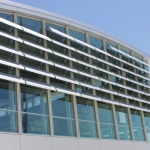| ANALYSIS:Sustainable constructions include performing window structures |
| English Section Publicat de Ovidiu Stefanescu 02 Oct 2013 09:02 |
 The emphasis put in recent years on the idea of sustainability in the construction industry may induce suspicion of the existence of some purely commercial intentions behind this media spectacle - and beyond. Given that this concept is discussed by system suppliers every time they have the opportunity, whilst the decision makers in politics apply measures with international implications and the promoters of this concept have important financial advantages - all these facts led some experts to suspect a so-called attitude of "greenwashing". They consider that the care for the environment and energy efficiency are nothing but clever ways to disguise attention from the real goal, which remains the everlasting profit maximization. But the truth is somewhere in the middle, meaning that the sustainable development generates indeed a breakthrough, but there are deviations from the general trend, because some companies try to gain unfair advantages from a false sustainable approach. The windows and doors market was undoubtedly influenced by the aforementioned trends, especially because the systems that are part of the structure of a building envelope are the main interface with the external environment. This reality creates a professional obligation to link the entire issue related to the production and installation of window assemblies directly to the concepts of energy efficiency and comfort level for the users. Surprisingly, the thermo-insulating joinery is the most vulnerable construction material in what concerns terms of heat resistance and, therefore, the challenge of finding the optimal solution is greater. The implementation of sustainability principles is automatically reflected by the substantial increase in production costs, considering the use of complex manufacturing technology and raw materials of the highest quality (without taking into account additional expenses for research and development, which are, in most cases, substantial). For the reasons stated in the previous argumentation, there are a limited number of suppliers who can meet all these sustainability principles and have the financial capacity and knowledge required for such operations. The emphasis put in recent years on the idea of sustainability in the construction industry may induce suspicion of the existence of some purely commercial intentions behind this media spectacle - and beyond. Given that this concept is discussed by system suppliers every time they have the opportunity, whilst the decision makers in politics apply measures with international implications and the promoters of this concept have important financial advantages - all these facts led some experts to suspect a so-called attitude of "greenwashing". They consider that the care for the environment and energy efficiency are nothing but clever ways to disguise attention from the real goal, which remains the everlasting profit maximization. But the truth is somewhere in the middle, meaning that the sustainable development generates indeed a breakthrough, but there are deviations from the general trend, because some companies try to gain unfair advantages from a false sustainable approach. The windows and doors market was undoubtedly influenced by the aforementioned trends, especially because the systems that are part of the structure of a building envelope are the main interface with the external environment. This reality creates a professional obligation to link the entire issue related to the production and installation of window assemblies directly to the concepts of energy efficiency and comfort level for the users. Surprisingly, the thermo-insulating joinery is the most vulnerable construction material in what concerns terms of heat resistance and, therefore, the challenge of finding the optimal solution is greater. The implementation of sustainability principles is automatically reflected by the substantial increase in production costs, considering the use of complex manufacturing technology and raw materials of the highest quality (without taking into account additional expenses for research and development, which are, in most cases, substantial). For the reasons stated in the previous argumentation, there are a limited number of suppliers who can meet all these sustainability principles and have the financial capacity and knowledge required for such operations. |
ABONARE REVISTA (click aici): PROIECTE | INVESTITII | REVISTE | INDEX COMPANII
DATE DE CONTACT: Agenda Constructiilor & Fereastra - Tel/Fax: 021-336.04.16, 031-401.63.88
Stiri & Comunicate
Documente
03 oct 2013
12 iun 2013
24 apr 2013




















































